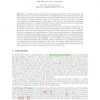469 search results - page 10 / 94 » On Adversary Models and Compositional Security |
ICALP
2005
Springer
14 years 1 months ago
2005
Springer
In this paper we study the link between formal and cryptographic models for security protocols in the presence of a passive adversary. In contrast to other works, we do not conside...
ACNS
2003
Springer
14 years 26 days ago
2003
Springer
Key exposures, known or inconspicuous, are a real security threat. Recovery mechanisms from such exposures are required. For digital signatures such a recovery should ideally —an...
TCC
2009
Springer
14 years 8 months ago
2009
Springer
It is well known that general secure function evaluation (SFE) with information-theoretical (IT) security is infeasible in presence of a corrupted majority in the standard model. ...
CSFW
2008
IEEE
14 years 2 months ago
2008
IEEE
Composition theorems in simulation-based approaches allow to build complex protocols from sub-protocols in a modular way. However, as first pointed out and studied by Canetti and ...
ASIACRYPT
2008
Springer
13 years 9 months ago
2008
Springer
Abstract. In secure computation among a set P of players one considers an adversary who can corrupt certain players. The three usually considered types of corruption are active, pa...

